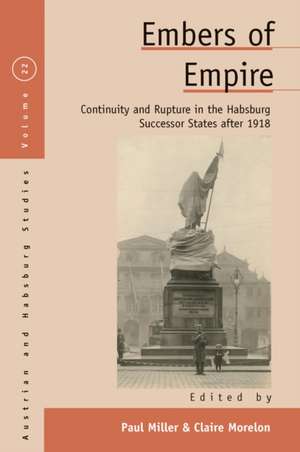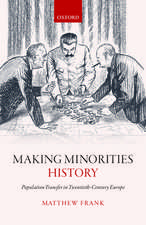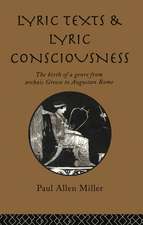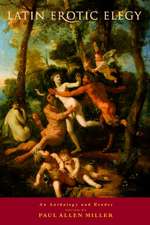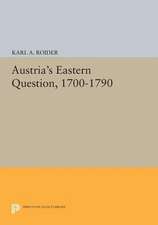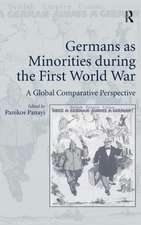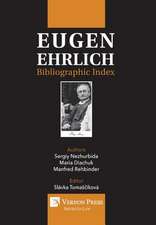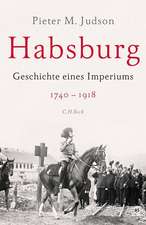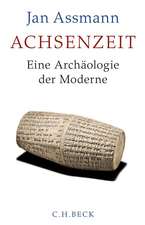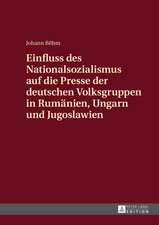Embers of Empire: Austrian and Habsburg Studies
Editat de Paul Miller, Claire Morelonen Limba Engleză Paperback – 12 noi 2021
| Toate formatele și edițiile | Preț | Express |
|---|---|---|
| Paperback (1) | 301.20 lei 6-8 săpt. | |
| BERGHAHN BOOKS – 12 noi 2021 | 301.20 lei 6-8 săpt. | |
| Hardback (1) | 832.95 lei 6-8 săpt. | |
| BERGHAHN BOOKS – 31 oct 2018 | 832.95 lei 6-8 săpt. |
Din seria Austrian and Habsburg Studies
- 14%
 Preț: 690.65 lei
Preț: 690.65 lei -
 Preț: 223.05 lei
Preț: 223.05 lei -
 Preț: 223.50 lei
Preț: 223.50 lei -
 Preț: 225.45 lei
Preț: 225.45 lei - 23%
 Preț: 749.77 lei
Preț: 749.77 lei - 23%
 Preț: 806.98 lei
Preț: 806.98 lei - 23%
 Preț: 862.01 lei
Preț: 862.01 lei - 23%
 Preț: 803.59 lei
Preț: 803.59 lei -
 Preț: 218.99 lei
Preț: 218.99 lei - 23%
 Preț: 993.41 lei
Preț: 993.41 lei -
 Preț: 151.22 lei
Preț: 151.22 lei - 23%
 Preț: 805.68 lei
Preț: 805.68 lei - 23%
 Preț: 751.41 lei
Preț: 751.41 lei - 23%
 Preț: 749.32 lei
Preț: 749.32 lei - 23%
 Preț: 751.25 lei
Preț: 751.25 lei -
 Preț: 261.93 lei
Preț: 261.93 lei -
 Preț: 258.88 lei
Preț: 258.88 lei - 23%
 Preț: 747.99 lei
Preț: 747.99 lei - 23%
 Preț: 748.14 lei
Preț: 748.14 lei -
 Preț: 258.07 lei
Preț: 258.07 lei -
 Preț: 259.80 lei
Preț: 259.80 lei -
 Preț: 263.29 lei
Preț: 263.29 lei -
 Preț: 262.52 lei
Preț: 262.52 lei - 23%
 Preț: 752.88 lei
Preț: 752.88 lei -
 Preț: 263.47 lei
Preț: 263.47 lei - 23%
 Preț: 750.49 lei
Preț: 750.49 lei -
 Preț: 260.96 lei
Preț: 260.96 lei -
 Preț: 260.41 lei
Preț: 260.41 lei -
 Preț: 259.80 lei
Preț: 259.80 lei -
 Preț: 293.29 lei
Preț: 293.29 lei
Preț: 301.20 lei
Nou
Puncte Express: 452
Preț estimativ în valută:
57.64€ • 59.96$ • 47.59£
57.64€ • 59.96$ • 47.59£
Carte tipărită la comandă
Livrare economică 15-29 aprilie
Preluare comenzi: 021 569.72.76
Specificații
ISBN-13: 9781800732124
ISBN-10: 1800732120
Pagini: 344
Dimensiuni: 152 x 229 x 19 mm
Greutate: 0.5 kg
Editura: BERGHAHN BOOKS
Seria Austrian and Habsburg Studies
ISBN-10: 1800732120
Pagini: 344
Dimensiuni: 152 x 229 x 19 mm
Greutate: 0.5 kg
Editura: BERGHAHN BOOKS
Seria Austrian and Habsburg Studies
Notă biografică
Paul Miller teaches history at the John Paul II Catholic University of Lublin (Poland) and at McDaniel College in the U.S. His forthcoming book, Misfire: The Sarajevo Assassination and the Winding Road to World War I, will be published by Oxford University Press in February 2022.
Descriere
Descriere de la o altă ediție sau format:
The collapse of the Habsburg Monarchy at the end of World War I ushered in a period of radical change for East-Central European political structures and national identities. Yet this transformed landscape inevitably still bore the traces of its imperial past. Breaking with traditional histories that take 1918 as a strict line of demarcation, this collection focuses on the complexities that attended the transition from the Habsburg Empire to its successor states. In so doing, it produces new and more nuanced insights into the persistence and effectiveness of imperial institutions, as well as the sources of instability in the newly formed nation-states.
